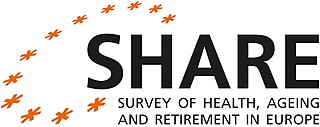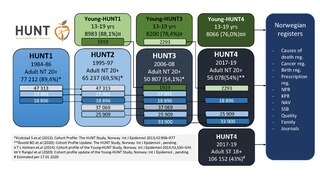Related Research Articles
Psychological testing refers to the administration of psychological tests. Psychological tests are administered or scored by trained evaluators. A person's responses are evaluated according to carefully prescribed guidelines. Scores are thought to reflect individual or group differences in the construct the test purports to measure. The science behind psychological testing is psychometrics.
Survey methodology is "the study of survey methods". As a field of applied statistics concentrating on human-research surveys, survey methodology studies the sampling of individual units from a population and associated techniques of survey data collection, such as questionnaire construction and methods for improving the number and accuracy of responses to surveys. Survey methodology targets instruments or procedures that ask one or more questions that may or may not be answered.
The Monitoring the Future (MTF) study, also known as the National High School Senior Survey, is a long-term epidemiological study that surveys trends in legal and illicit drug use among American adolescents and adults as well as personal levels of perceived risk and disapproval for each drug. The survey is conducted by researchers at the University of Michigan's Institute for Social Research, funded by research grants from the National Institute on Drug Abuse, one of the National Institutes of Health.
The General Social Survey (GSS) is a sociological survey created in 1972 by the National Opinion Research Center (NORC) at the University of Chicago and funded by the National Science Foundation. The GSS collects information biannually and keeps a historical record of the concerns, experiences, attitudes, and practices of residents of the United States.
The National Longitudinal Surveys (NLS) are a set of surveys sponsored by the Bureau of Labor Statistics (BLS) of the U.S. Department of Labor. These surveys have gathered information at multiple points in time on the labor market experiences and other significant life events of several groups of men and women. Each of the NLS samples consists of several thousand individuals, many of whom have been surveyed over several decades.
David Percy Shaffer was a South African-born British-American physician and pediatrician. He was the Irving Philips Professor of Child Psychiatry in the Departments of Psychiatry and Pediatrics, at Columbia University's College of Physicians and Surgeons in New York City, now the Columbia University Vagelos College of Physicians and Surgeons. Shaffer was also the chief of pediatric psychiatry at New York–Presbyterian Hospital and chief of the Division of Child and Adolescent Psychiatry, New York State Psychiatric Institute. He was the former spouse of renowned British-American journalist Anna Wintour.
Cognitive pretesting, or cognitive interviewing, is a field research method where data is collected on how the subject answers interview questions. It is the evaluation of a test or questionnaire before it's administered. It allows survey researchers to collect feedback regarding survey responses and is used in evaluating whether the question is measuring the construct the researcher intends. The data collected is then used to adjust problematic questions in the questionnaire before fielding the survey to the full sample of people.
The Collaborative Studies on the Genetics of Alcoholism (COGA) is an eleven-center research project in the United States designed to understand the genetic basis of alcoholism. Research is conducted at University of Connecticut, Indiana University, University of Iowa, SUNY Downstate Medical Center, Washington University in St. Louis, University of California at San Diego, Rutgers University, University of Texas Health Science Center at San Antonio, Virginia Commonwealth University, Icahn School of Medicine at Mount Sinai, and Howard University.

The Survey of Health, Ageing and Retirement in Europe (SHARE) is a multidisciplinary and cross-national panel database of micro data on health, socio-economic status and social and family networks. In seven survey waves to date, SHARE has conducted approximately 380,000 interviews with about 140,000 individuals aged 50 and over. The survey covers 28 European countries and Israel.
The Structured Clinical Interview for DSM (SCID) is a semi-structured interview guide for making diagnoses according to the diagnostic criteria published in the Diagnostic and Statistical Manual of Mental Disorders (DSM). The development of SCID has followed the evolution of the DSM and multiple versions are available for a single edition covering different categories of mental disorders. The first SCID was released in 1989, SCID-IV was published in 1994 and the current version, SCID-5, is available since 2013.

In research of human subjects, a survey is a list of questions aimed for extracting specific data from a particular group of people. Surveys may be conducted by phone, mail, via the internet, and also at street corners or in malls. Surveys are used to gather or gain knowledge in fields such as social research and demography.
The Study on global AGEing and adult health (SAGE) is run by the World Health Organization. An objective for SAGE is to compile comprehensive longitudinal data on the health and well-being of adult populations and the ageing process across different countries, through primary data collection, secondary data analysis and cross-study collaborations.
Project Talent is a national longitudinal study that first surveyed over 440,000 American high school students in 1960. At the time, it was the largest and most comprehensive study of high school students ever conducted in the United States. Designed by American Institutes for Research founder John C. Flanagan, Project Talent was intended as “the first scientifically planned national inventory of human talents.” Students from 1,353 schools across the country participated in two full to four days of testing. Fifty years later, the data is still widely used in multiple fields of study and follow-up studies are underway with original participants.
The Future of Families and Child Wellbeing Study (FFCWS) is a longitudinal birth cohort study of American families. Formerly known as the Fragile Families and Child Wellbeing Study, the study’s name was changed in January 2023.

The Trøndelag Health Study is a cohort health study performed in the Norwegian county of Trøndelag. HUNT is considered one of the most extensive cohort studies ever conducted in any country. The HUNT Research Centre, which is responsible for collecting and providing access to the data and samples from the study, is part of the Faculty of Medicine and Health Sciences at the Norwegian University of Science and Technology (NTNU).
The Child Mania Rating Scales (CMRS) is a 21-item diagnostic screening measure designed to identify symptoms of mania in children and adolescents aged 9–17 using diagnostic criteria from the DSM-IV, developed by Pavuluri and colleagues. There is also a 10-item short form. The measure assesses the child's mood and behavior symptoms, asking parents or teachers to rate how often the symptoms have caused a problem for the youth in the past month. Clinical studies have found the CMRS to be reliable and valid when completed by parents in the assessment of children's bipolar symptoms. The CMRS also can differentiate cases of pediatric bipolar disorder from those with ADHD or no disorder, as well as delineating bipolar subtypes. A meta-analysis comparing the different rating scales available found that the CMRS was one of the best performing scales in terms of telling cases with bipolar disorder apart from other clinical diagnoses. The CMRS has also been found to provide a reliable and valid assessment of symptoms longitudinally over the course of treatment. The combination of showing good reliability and validity across multiple samples and clinical settings, along with being free and brief to score, make the CMRS a promising tool, especially since most other checklists available for youths do not assess manic symptoms.
The nine-item Patient Health Questionnaire (PHQ-9) is a depressive symptom scale and diagnostic tool introduced in 2001 to screen adult patients in primary care settings. The instrument assesses for the presence and severity of depressive symptoms and a possible depressive disorder. The PHQ-9 is a component of the larger self-administered Patient Health Questionnaire (PHQ), but can be used as a stand-alone instrument. The PHQ is part of Pfizer's larger suite of trademarked products, called the Primary Care Evaluation of Mental Disorders (PRIME-MD). The PHQ-9 takes less than three minutes to complete. It is scored by simply adding up the individual items' scores. Each of the nine items reflects a DSM-5 symptom of depression. Primary care providers can use the PHQ-9 to screen for possible depression in patients.
Adolescent sleep is typically poor in duration and quality. Sleep duration and quality reduce to suboptimal levels, and sleep duration variability and latency increases during adolescence. Sleep recommendations suggest that adolescents should obtain 8–10 hours of sleep per night. Additionally, there is a shift in the body's circadian rhythm such that sleep and wake timings become later during adolescence. Technology, social factors, and physical development are thought to contribute to poor sleep during this time. Poor sleep duration and quality in adolescents has been linked with altered brain functioning and development, poor mental and physical health, as well as higher rates of disease and mortality. The concerns surrounding poor sleep during adolescence has garnered significant public attention, especially concerning policies related to school start times.
The ABCD Study is an ongoing longitudinal research study being undertaken by a consortium of 21 data collection sites across the United States. It is the largest long-term study of brain development and child health in the US. The study collects data on the behavior and brain development of over 11,500 children beginning at age 9-10 and continuing through young adulthood. The study collected data from youth in seven primary domains: physical health, mental health, brain imaging, biospecimens, neurocognition, substance use, and culture and environment. Data are also collected from participating youths' parents, including physical health, mental health, substance use, and culture and environment.
References
- ↑ Huebner, Beth M.; Bynum, Timothy S. (2016-04-28). The Handbook of Measurement Issues in Criminology and Criminal Justice. John Wiley & Sons. p. 563. ISBN 9781118868768.
- 1 2 3 4 5 "About Add Health". Add Health. Retrieved 2017-09-24.
- ↑ Landau, Elizabeth (2010-02-26). "Liberalism, atheism, male sexual exclusivity linked to IQ". CNN. Retrieved 2017-09-24.
- 1 2 Connolly, Ceci (2005-03-18). "Teen Pledges Barely Cut STD Rates, Study Says". The Washington Post. Retrieved 2017-09-24.